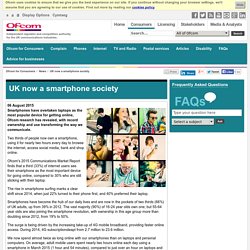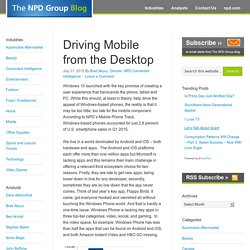

Le Web qui tient dans la main a pris le pouvoir. Il aura fallu attendre un peu moins d’une décennie depuis la sortie du premier iPhone pour en arriver là, mais c’est fait.

Selon Médiamétrie, les visites web venues des supports mobiles ont dépassé celles venues des ordinateurs. C’est une première en France. Dans le détail, 43,7 % des visites viennent de smartphones (+3,7 points par rapport à août), 9,1 % de tablettes (+0,6) tandis que les ordinateurs chutent à 46,2 % (-5). Cette annonce fait suite à celle de Google, il y a quelques jours, qui nous a appris que les requêtes sur le moteur de recherche venues de mobiles avaient dépassé cet été celles venues des ordinateurs. C’est tout sauf une surprise. Basses histoires de référencement Conséquence : le Web doit aujourd’hui pouvoir tenir dans la main et se charger rapidement malgré des débits mobiles variables. En avril, en effet, Google a décidé de faire évoluer son algorithme pour favoriser les pages lisibles sur tous les écrans. Guerre du contrôle Erwan CARIO. La télévision toujours très regardée, mais son mode de « consommation » se diversifie.
Infographic: How Mobile Use Varies Across Generations. The Rise of Phone Reading. Last fall, Andrew Vestal found himself rocking his baby daughter, Ada, back to sleep every morning between 3 a.m. and 5 a.m.

Cradling Ada in the crook of his arm, he discovered he could read his dimly-lit phone with one hand. That’s how he read David Mitchell’s 624-page science-fiction saga “The Bone Clocks.” Mr. Vestal’s iPhone has offered him a way to squeeze in time for reading that he otherwise might have given up. He reads on lunch breaks. Before he tried it, he wondered whether reading in snippets might be dissatisfying. Ever since the first hand-held e-readers were introduced in the 1990s, the digital-reading revolution has turned the publishing world upside down. “The future of digital reading is on the phone,” said Judith Curr, publisher of the Simon & Schuster imprint Atria Books. For now, tablets like the iPad and Kindle Fire remain the most popular platform to read digital books. One reason people are reading on phones is convenience.
Amazon has also noted the development. UK now a smartphone society. 06 August 2015 Smartphones have overtaken laptops as the most popular device for getting online, Ofcom research has revealed, with record ownership and use transforming the way we communicate.

Two thirds of people now own a smartphone, using it for nearly two hours every day to browse the internet, access social media, bank and shop online. Ofcom's 2015 Communications Market Report finds that a third (33%) of internet users see their smartphone as the most important device for going online, compared to 30% who are still sticking with their laptop. The rise in smartphone surfing marks a clear shift since 2014, when just 22% turned to their phone first, and 40% preferred their laptop.
Smartphones have become the hub of our daily lives and are now in the pockets of two thirds (66%) of UK adults, up from 39% in 2012. The surge is being driven by the increasing take-up of 4G mobile broadband, providing faster online access. 4G users are doing more Selfies and storage. Driving Mobile from the Desktop. Windows 10 launched with the key promise of creating a user experience that transcends the phone, tablet and PC.

While this should, at least in theory, help drive the appeal of Windows-based phones, the reality is that it may be too little, too late for the mobile component. According to NPD’s Mobile Phone Track, Windows-based phones accounted for just 2.8 percent of U.S. smartphone sales in Q1 2015. We live in a world dominated by Android and iOS – both hardware and apps. The Android and iOS platforms each offer more than one million apps but Microsoft is lacking apps and this remains their main challenge in offering a relevant third ecosystem choice for two reasons. Firstly, they are late to get new apps, being lower down in line for any developer; secondly, sometimes they are so low down that the app never comes. Source: The NPD Group/Connected Intelligence Research, July 2015.